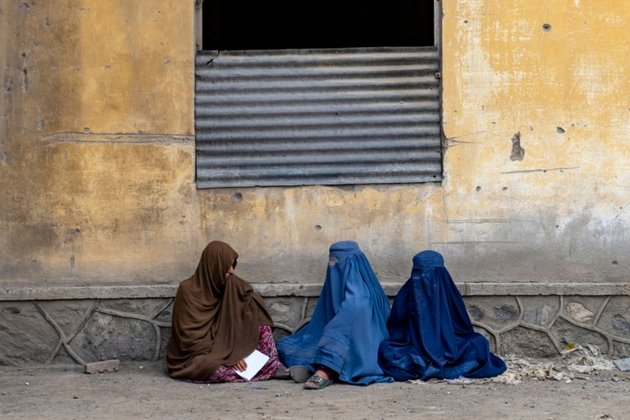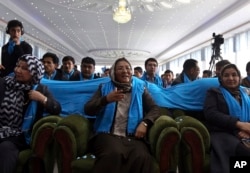

Afghanistan and Saudi Arabia are known for their Shariah-based legal systems and authoritarian ways of governance. But the two Islamist governments are on divergent paths regarding women’s work and education.
In the Saudi kingdom, where until a few years ago women were deprived of many social rights and freedoms, the women’s employment rate has surged to 37%, according to U.S. and Saudi officials.
In the high-tech industry, Saudi women’s participation has gone up so much that recently U.S. Ambassador to Saudi Arabia Michael Ratney humorously suggested that U.S. tech hub Silicon Valley could take inspiration from Saudi Arabia’s efforts to foster female entrepreneurship.
‘In the tech sector in Saudi Arabia, a third of the workforce is women – which as I understand it is higher than Silicon Valley,’ Ratney said at an event in July.
The progress extends beyond the tech industry, with women securing positions in government and private companies and leading startups at unprecedented rates. Furthermore, literacy among young Saudi women 15 to 24 years of age has reached 99%, marking a significant milestone. In May, astronaut Rayyanah Barnawi became the first Arab woman in history to travel into space.
FILE – People walk past a poster with the picture of Saudi Space Commission astronauts Ali Al-Qarni, left, and Rayyanah Barnawi, of the Axiom Mission 2, at a government-organized viewing party in Riyadh, May 21, 2023.
The kingdom also has appointed five female ambassadors, including Princess Reema bint Bandar Al Saud, who represents Saudi Arabia in the United States.
‘Today in the kingdom, we have more women receiving advanced degrees than men,’ Al Saud said at an event in July jointly organized by the nonpartisan Atlantic Council and Georgetown University in Washington.
Crown Prince Mohammed bin Salman, who has been criticized in the past for his human rights violations, is credited with spearheading a reformist and developmental agenda that includes greater rights and opportunities for women.
Widely referred to as an authoritarian monarchy, Saudi Arabia still has no female ministers in the government or a woman in the royal court where the Saudi royal family decides nearly all of the kingdom’s affairs.
But even there, change is expected.
‘There are several women in leadership positions already, and I only expect it to increase with time,’ Sussan Saikali, a research associate at Arab Gulf States Institute, told VOA.
‘The Saudi government has removed several laws that were previously restricting women’s ability to work in certain sectors, while also passing several anti-discrimination and anti-harassment laws,’ she said.
Taliban’s shariah
Afghanistan, meanwhile, has witnessed a regression in women’s access to fundamental human rights and freedoms under the Taliban regime, including setbacks in education and employment, purportedly based on Islamic and cultural justifications.
 FILE – Habiba Sarabi, then an Afghan vice presidential candidate, attends a campaign rally in Kabul, March 17, 2014.
FILE – Habiba Sarabi, then an Afghan vice presidential candidate, attends a campaign rally in Kabul, March 17, 2014.
Habiba Sarabi, Afghanistan’s former minister of women’s affairs, believes the Taliban’s extremist ideology stems from decades of internationalization of Islamic extremism sponsored by oil-rich Gulf monarchies, chiefly the Saudis.
‘For too long, the Gulf countries invested heavily in Islamic extremism, but now they have realized their mistakes and have started pursuing a different civilizational path,’ Sarabi told VOA.
Many Islamic organizations, countries and experts have objected to the Taliban’s misogynistic policies, calling them inconsistent with Islamic principles and values.
The Taliban, like Saudi Arabia, operate under an unelected supreme leader who wields unchecked power, accountable only to a divine authority.
‘The man [Taliban supreme leader] in Kandahar thinks he is the representative of God and he is not bound by human laws,’ Sarabi said.
Taliban officials say they have restored women’s Islamic rights to decency and seclusion, a statement met with skepticism by many Islamic scholars.
‘We should not heed those people [countries] that chant for women’s education but do not allow education for women wearing the hijab,’ Sheikh Mohammad Khalid, the Taliban’s minister for the promotion of Islamic virtues and the prevention of vice, told a gathering of male tribal elders on Tuesday.
Saudi influence
Riyadh has not recognized the Taliban as Afghanistan’s legitimate government but has maintained contact with Taliban officials, most of whom travel to Saudi Arabia annually for the Islamic pilgrimage, Hajj.
During Hajj in June, Taliban Defense Minister Yaqub Mujahid was seen greeting Saudi Crown Prince Mohammed bin Salman, who is credited for backing women’s rights in his country. But it is not clear if he advised Yaqub about women’s rights in Islam. Yaqub is the son of the late Mullah Omar, one of the Taliban’s founding leaders, who is still widely revered among Taliban leaders.
‘I don’t necessarily think we can predict one country’s actions by the other. Countries like Afghanistan have a wholly different system than Saudi Arabia, despite sharing a religion,’ Saikali said.
Sarabi, the former Afghan minister, said the Saudis and other Gulf monarchies like Qatar have extensive religious, economic and political influence over the Taliban that could sway the group into softening its harsh policies on women.
U.S. officials, recognizing the Taliban’s defiance of Western countries, have urged Saudi Arabia and other Muslim-majority nations to advocate for women’s rights within Afghanistan.
Rina Amiri, U.S. special envoy for Afghan women, girls and human rights – a role not seen in other countries dealing with the Taliban – has urged Muslim states to prevent a normalization of the Taliban’s misogyny.
After meeting officials from Saudi Arabia, the UAE and the Organization of Islamic Cooperation in July, Amiri wrote on X, formerly known as Twitter, about the ‘dangerous precedent’ set by the extreme repression of Afghan women and girls.
In February, the Saudis closed their embassy in Kabul, reportedly over security concerns. The kingdom has donated $1.6 million to the $3.2 billion the United Nations has sought for a humanitarian response in Afghanistan this year.
During her July speech in Washington, Reema said it was essential for the world to invest in women’s empowerment to build more inclusive and equitable societies. She particularly emphasized the importance of education for women.
‘Education and training help level the playing field. It gives women equal footing in the workplace and fosters not only gender equality but equity,’ she said.
Missing from her remarks was Afghanistan.
24World Media does not take any responsibility of the information you see on this page. The content this page contains is from independent third-party content provider. If you have any concerns regarding the content, please free to write us here: contact@24worldmedia.com

A Brief Look at the History of Telematics and Vehicles

Tips for Helping Your Students Learn More Efficiently

How To Diagnose Common Diesel Engine Problems Like a Pro

4 Common Myths About Wildland Firefighting Debunked

Is It Possible To Modernize Off-Grid Living?

4 Advantages of Owning Your Own Dump Truck

5 Characteristics of Truth and Consequences in NM

How To Make Your Wedding More Accessible

Ensure Large-Format Printing Success With These Tips

4 Reasons To Consider an Artificial Lawn

The Importance of Industrial Bearings in Manufacturing

5 Tips for Getting Your First Product Out the Door